E-Pluribus | July 23, 2024
Making higher education higher again; woke military training; and calling for another new birth of freedom.
A round-up of the latest and best musings on the rise of illiberalism in the public discourse:
Yolanda Watson Spiva: Restoring the Promise of Higher Education is Key to Bridging Political Divisions
It would seem uncontroversial to suggest that the primary mission of institutions of higher education is education. But too often that end is not supported by the means. Writing for Real Clear Education, Yolanda Watson Spiva argues that colleges and universities are falling short of their promise to improve graduates’ lives and are instead becoming part of the problem.
Higher education has [. . .] not avoided the increasing partisan strife roiling the country. Indeed, many campuses have served as epicenters of contentious protests over the Israel-Hamas war, placing colleges at the center of national debates over free speech and U.S. foreign policy. While summer might provide a brief respite, students’ return in the fall—coinciding with one of the most consequential elections in U.S. history—promises to reignite campus tensions. It should not be surprising that colleges are so deeply embroiled in these critical issues, however. For decades, colleges and universities have served as battlegrounds for political discontent, spanning issues both related to and beyond the realm of higher education.
This entanglement stems from the intertwined nature of the challenges facing American democracy and higher education. They are two sides of the same coin. And while higher education stands at the center of so many of our country’s most fierce debates, it may also hold the key to resolving our disunity.
Institutions have long been scrutinized for their role in shaping the minds of America’s young people. Now, after years of highly publicized debates around student loan forgiveness and declining graduation rates, Americans are increasingly questioning whether higher education is worth the debt and expense. Enrollment is falling as a result. This growing skepticism toward higher education and the erosion of our public discourse are, in some ways, both symptoms of diminishing college outcomes. As more students struggle to reap the benefits of completing college, disillusionment with higher education spreads. And with fewer Americans attending college, even fewer have access to the robust civic education it provides.
[. . .]
In order to restore the compact between higher education and our democratic system, teaching students about the importance of civics and democracy is necessary, but insufficient. Although higher education has made significant progress in expanding access, it has stumbled on outcomes and completion. More than 40 million Americans now have some college credit, but no degree. For these learners, the promise of higher education has been an empty one. To deliver on its dual mission of economic mobility and civic participation, higher education must dramatically raise the bar on student outcomes and completion.
Read it all here.
Megan Rosevear: DEI, critical race theory pervades military trainings: report
The job of the military is to train literal warriors. Megan Rosevear of The College Fix tells of a new report suggesting the U.S. Armed Forces are increasingly interested in training social justice warriors.
Diversity, equity and inclusion and critical race theory topics now pervade U.S. Armed Forces educational trainings and programs, according to newly published research.
The recent report out of Arizona State University’s Center for American Institutions detailed the extensiveness of DEI training throughout the branches of the military and military academies, as well as highlighted an increasing budget for DEI training.
At the West Point, for example, students can minor in diversity and inclusion studies, taking courses titled “Social Inequality” and “Power and Difference” as well as classes focused on feminist and queer theory, the research found.
At the U.S. Air Force Academy, DEI training is required and includes topics such as Black Lives Matter, white fragility, and the 1619 project, the research found. In contrast, U.S. history is an optional elective.
“The research reveals serious problems within our military complex. The U.S. military now has a well-developed, taxpayer-funded DEI bureaucracy dedicated to rooting out ‘white privilege’ and white supremacy, and that allows for (and sometimes teaches) the overt criticism of the United States, its founding, its founders, and its founding documents, alleging that they are all rooted in systemic racism,” the report’s executive summary reads.
[. . .]
“Critical race theory is found in classroom instruction as well [as] in cadet training. Critical race theory comes directly out of Marxism. It claims that whites enjoy privileges as a race because of systematic racism embodied in our Constitution and history,” he said.
[. . .]
As well as DEI training, the U.S. Air Force encourages adding personal pronouns to email signatures because it may affect whether or not someone leaves the organization.
“Traditionally, young people enlisted for many reasons, with a major one being patriotism – to protect the family, country, and faith. That patriotism, if held by a white male, now raises suspicions of white supremacy,” the report states.
“A search for white supremacists – seemingly the only extremists that interest the military – has come up short,” according to the report, as “only 100 members of the military were deemed to be extremists out of a force of 2.1 million.” The problem is that Department of Defense officials have not issued a clear definition of what “extremism” is, and what “associations, expressions, and attitudes are prohibited,” it added.
Read the whole thing.
John Wood, Jr.: The Dialectic of Freedom
Without drawing any conclusions, John Wood, Jr. of the Foundation Against Intolerance & Racism (FAIR) ponders the meaning of “freedom” and asks readers to consider how the concept applies in our current political system. A willingness to consider other perspectives is how America has progressed beyond its remarkable yet imperfect founding. We shouldn’t oppose continued self-reflection on the road to an even more perfect union.
Freedom and equality, so foundational to the American experiment, present a natural tension between the two of them.
[. . .]
One could not take literally Jefferson’s claim that all men were created equal because Africans (taken from their homeland, prohibited from literacy, and subjected to the debasements of enslavement) were plainly not the equals of white men. And therefore, is the liberty of white men, for whom the Declaration was properly written in this view, not diminished by the curtailment of their right to enslave? It was this position Abraham Lincoln wryly lamented in his second inaugural address, when commented that “It may seem strange that any men should dare to ask a just God’s assistance in wringing their bread from the sweat of other men’s faces; but let us judge not that we be not judged.”
Today we would nearly all share Abraham Lincoln’s tragic bemusement at the conspicuous contradiction in the argument for slavery made on behalf of liberty. But many of us of a liberal and progressive disposition would react with incredulity to those conservatives and libertarians amongst us who might employ a similar logic in opposition to the expansion of government benefits that redistribute the wealth and labors of the American people. As Senator Rand Paul once said, “with regard to the idea whether or not you have a right to health care you have to realize what that implies. I am a physician. You have a right to come to my house and conscript me. It means you believe in slavery.”
There may have been something unwise in the extremity of Paul’s comparison, yet it serves to highlight the differing Americans views of freedom. The Bill of Rights enumerates certain freedoms of a negative kind: meaning that they are freedoms from the imposition of force and authority against key aspects of American life. The United States Constitution guarantees “the freedom of speech,” the freedom of assembly, the freedom to bear arms, among other rights established for the liberty of individuals. But these were negative rights in the sense that they were rights that prevented the encumbrance of man or government upon other individuals’ ability to assert themselves in these ways as citizens. They were not positive rights in the sense that they guaranteed certain goods that may even be vital to life and the pursuit of happiness, but would require an imposition on the liberty of others to ensure.
[. . .]
How meaningful is freedom without greater equality? Though it would seem undeniable that one’s personal choices affect the course of one’s life outcomes—one’s “pursuit of happiness”—is there an intellectually honest way to suggest that circumstances we do not choose have nothing to do with these outcomes? That those who suffered in slavery were merely unwilling to overcome the difficulty of their circumstances to achieve the American dream?
Read it all.
Around Twitter (X)
Commenting on an Adam Serwer article for the Atlantic, here’s Zaid Jilani:
Paul Farhi, formerly of the Washington Post, has a theory about alleged complicity of the media in hiding Joe Biden’s true condition. Not everyone is buying it.
And finally, Kamala Harris’s candidacy is making headlines around the world!



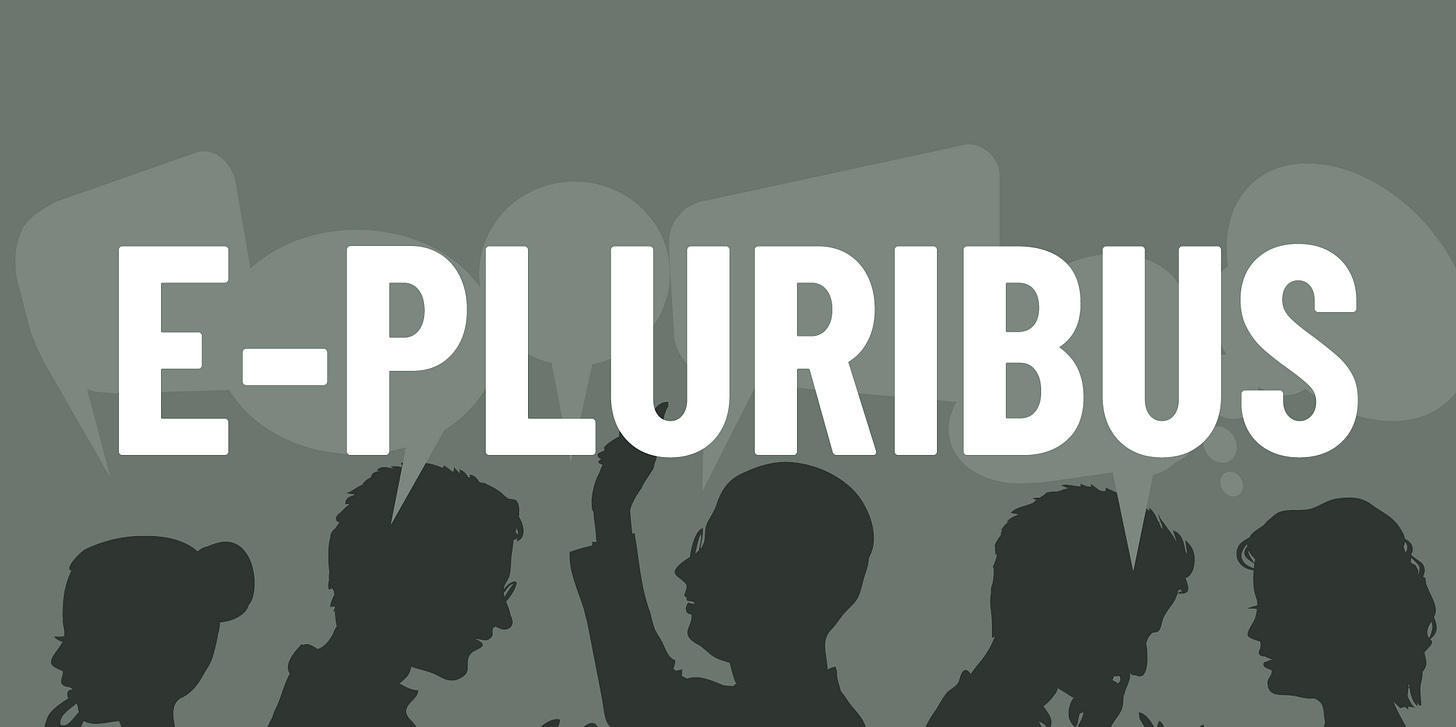
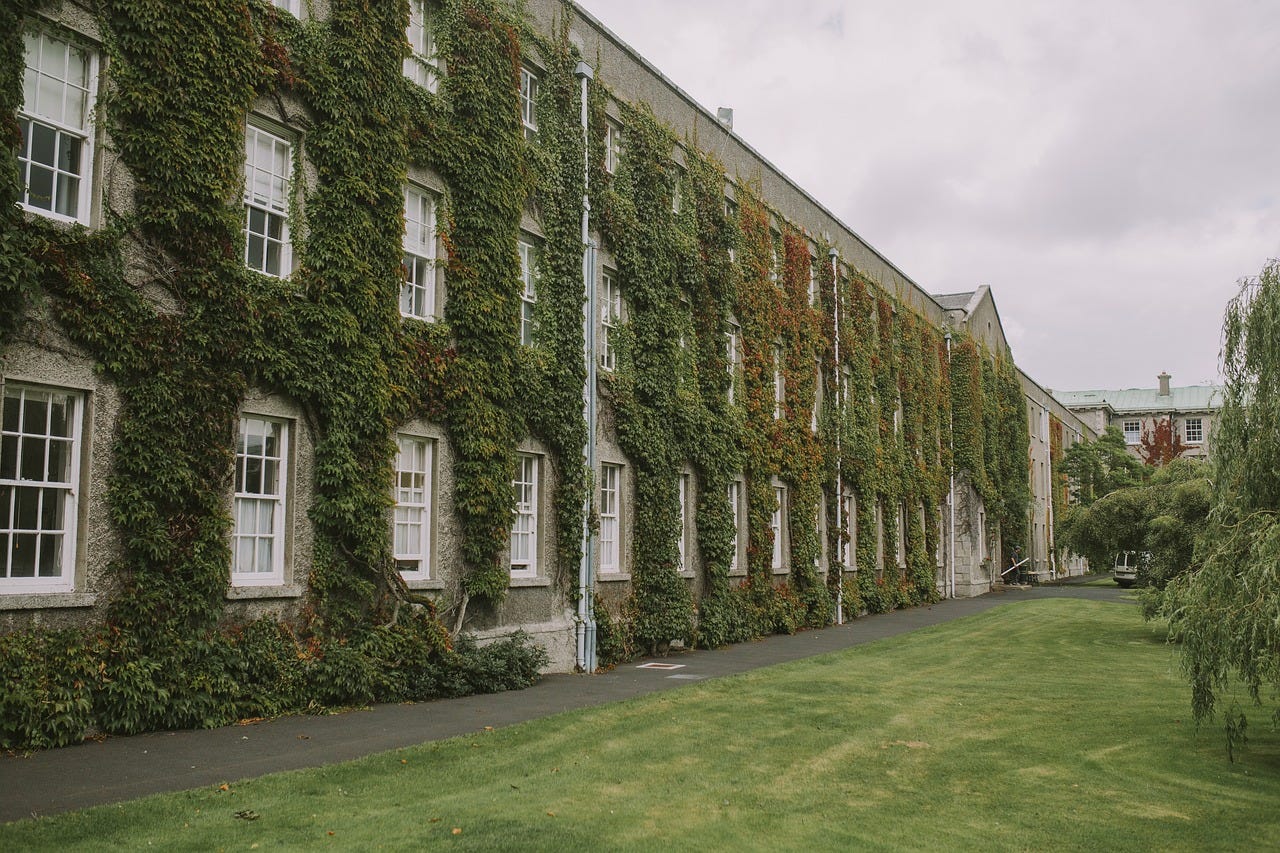
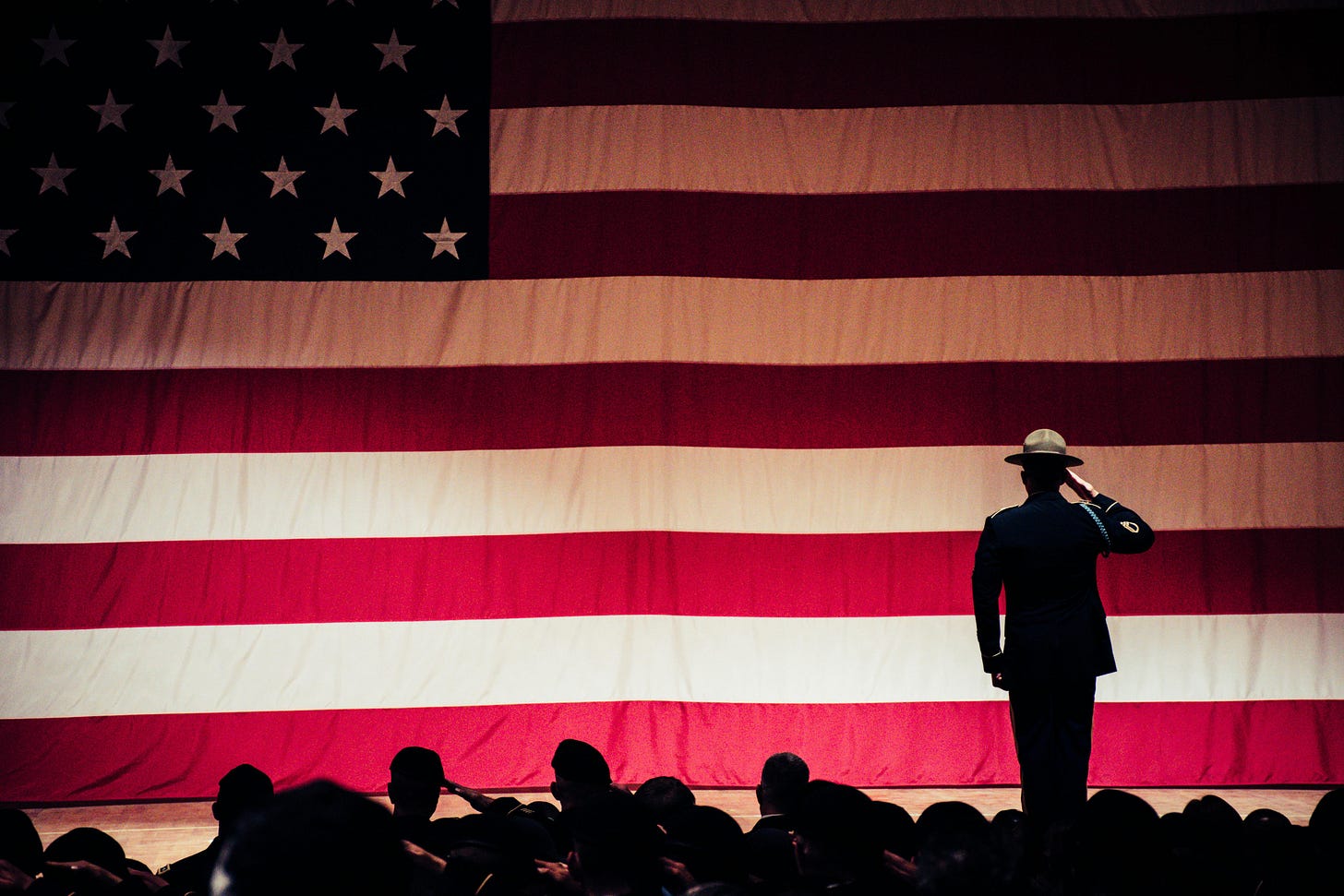
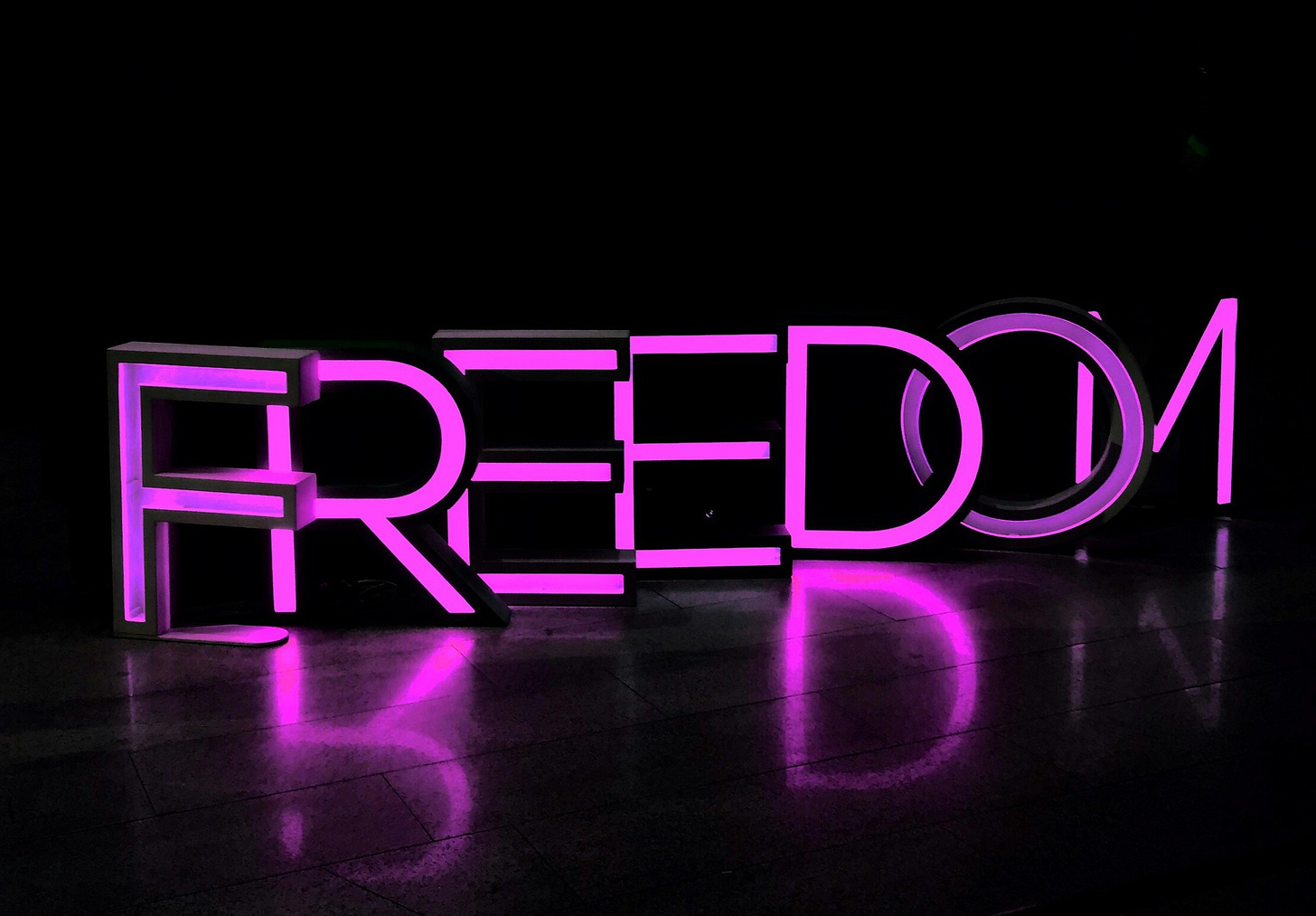
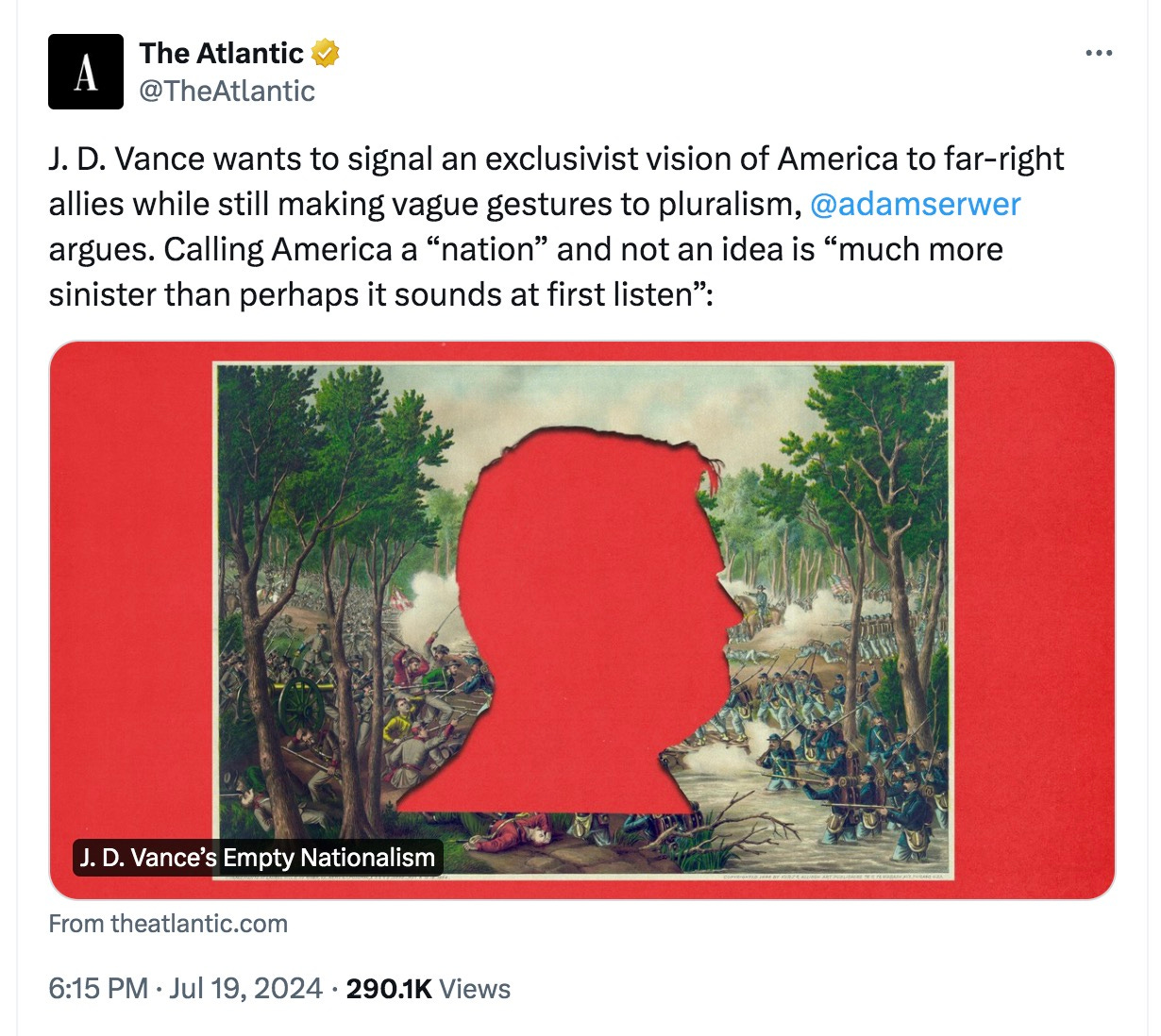
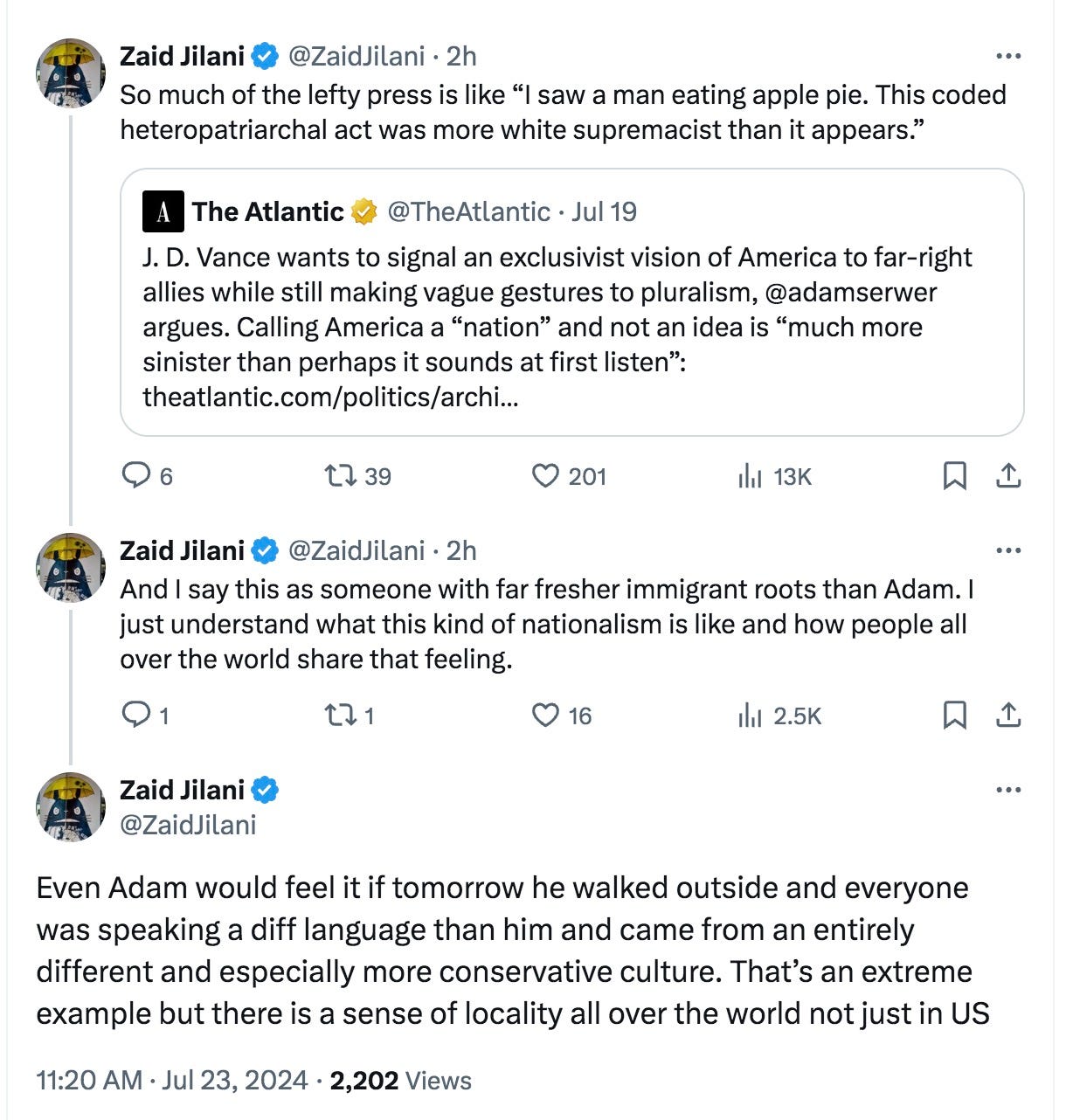
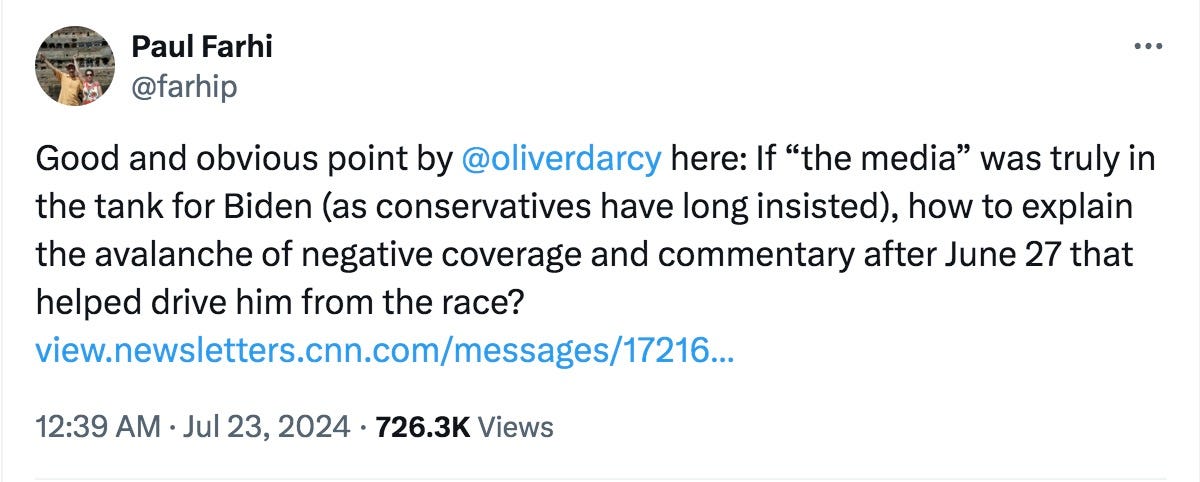
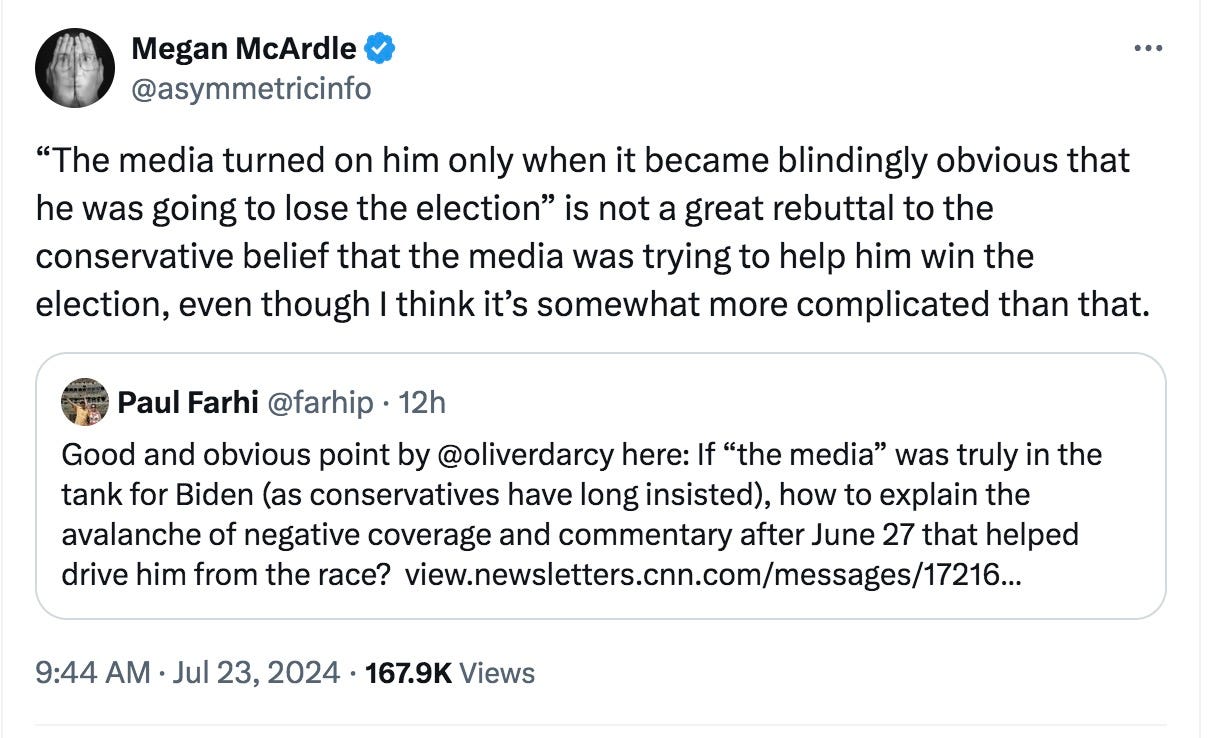
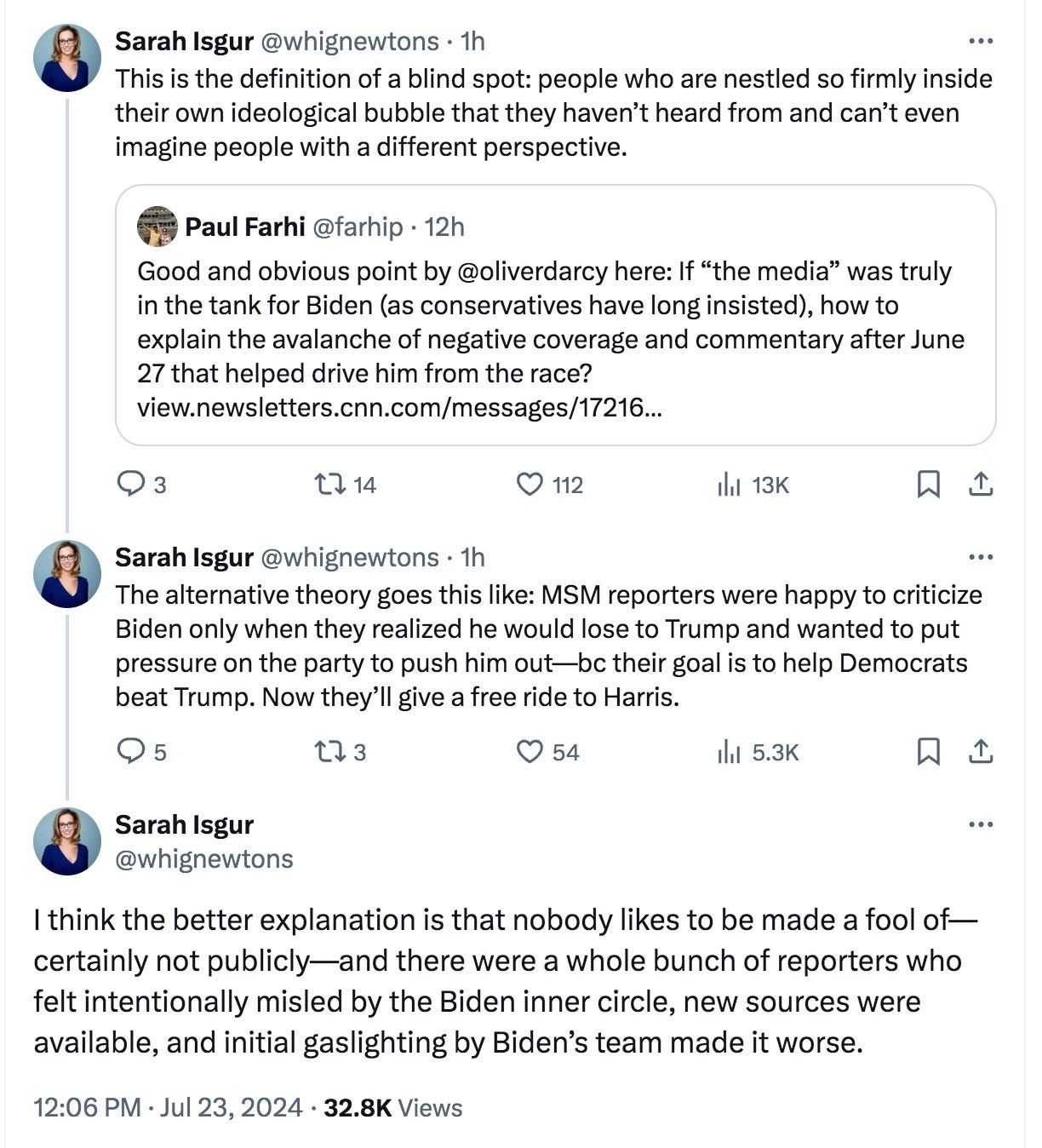
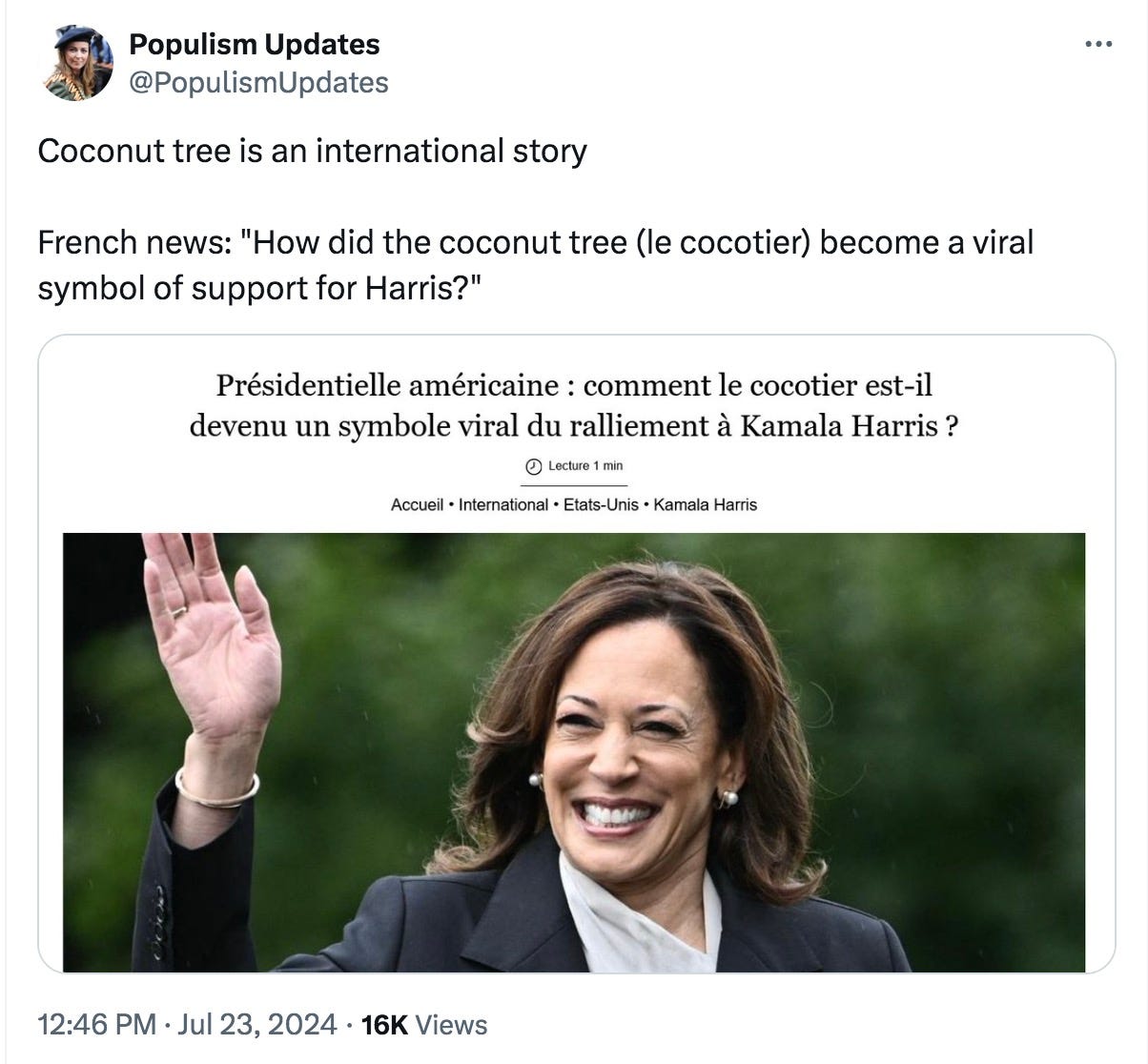
I am all for making higher education higher - but the educational institutions are not up for shrinking by 50%. The STEM subjects seem to have maintained their standards (to a greater or lesser extent) over the past half century. The social sciences and humanities have not. From what I saw of my daughter's engineering coursework 10 years ago, I think that expectations were reasonably comparable to what was expected of the engineering students that I TA'd 40 years earlier. It is my understanding that the average IQ of college graduates was ~115 around 1970 and is currently barely above average (note that some subjects require IQ's that are significanlty above average). No curriculium change will make up for the decrease in student capability. The fact is that a lot of students going to college should not be.
And I don't accept the working student excuse for reduced standards - it took me 5 years to do my MS in Materials Science, I was working full time, married, and rebuilding a house. I knew a fellow engineer who took 12 years to earn his engineering degree while working full time as a technician, being married, and raising a family.
I have a profound understanding of what you mean. But we should factor in the 'woke' ideology virus that hinders any progress in higher education. This is only part of the equation. Summary of Issues Affecting My Ph.D. Completion: Violation of Academic Freedom: These actions represent a concerted attack on academic integrity and freedom of expression; Ideological Censorship: The pervasive influence of "woke" and DEI ideologies created a hostile environment for intellectual diversity. You may find it helpful to read my complete interview: https://unbekoming.substack.com/p/heresy? https://palexander.substack.com/p/the-operation-warp-speed-ows-lockdown?